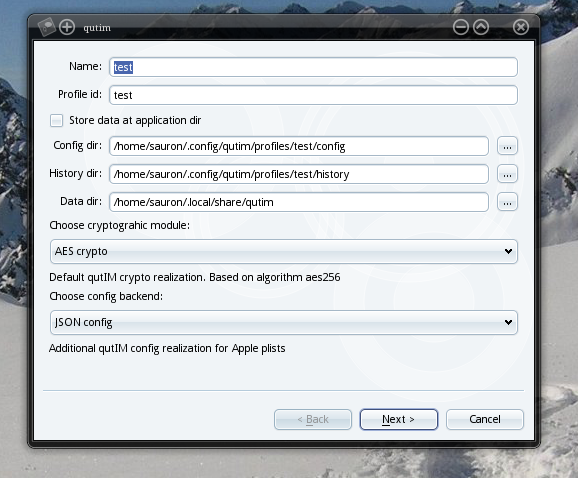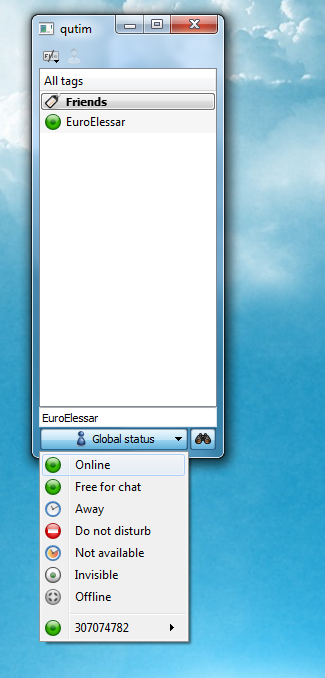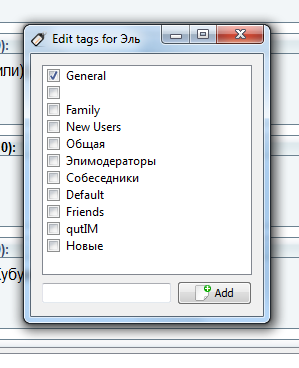qutIM 0.3 alpha - The Phoenix
Greetings dear habrovchane!
5 months have passed since the release of the latest news on the qutIM messenger, oddly enough, the project was not abandoned during this time, although due to personal problems of the developers (session, work, military registration and enlistment office and other joys of life), the speed of development was clearly reduced. At the moment we are ready to provide you with the alpha version of the new branch of the development of Kutima. Version 0.3 Alpha .
What is new?
What is in the near future?
')
The code was once again completely rewritten, this time to create a full-fledged API for creating plugins , for example:
Note that the writing of plug-ins, including protocol ones, was greatly simplified: many non-obvious things were removed, a number of verbal agreements were replaced by classes for their automation, etc. In the process of integration with QtScript'om (implementation of JavaScript from the trolls), soon it will be possible to write full plug-ins in this script language, then there will be examples on their use, but now it is possible to write modules using QML. But, unfortunately, we do not have enough hands to develop a branch with an interface based on it.
Along with the reworking of the API for plug-ins, the way to create the implementation of protocols was naturally reworked. Due to this, at the moment, the theoretician theoretically supports ~ 17 protocols, the exact list can be found here and there .
In the process of creating a new Kutima interface, but due to the lack of developers, more emphasis was placed on stabilizing the existing one and creating a new functionality more than a graphical interface, alas. By the next release, we will definitely correct :)

PS Warning! Alpha version of qutIM can eat your hamster!
PPS, it’s hard to use it. Or if in Russian - plugin developers are invited)
PPPS Packages do not lay out for several reasons:
5 months have passed since the release of the latest news on the qutIM messenger, oddly enough, the project was not abandoned during this time, although due to personal problems of the developers (session, work, military registration and enlistment office and other joys of life), the speed of development was clearly reduced. At the moment we are ready to provide you with the alpha version of the new branch of the development of Kutima. Version 0.3 Alpha .
What is new?
- Password encryption - now you can access passwords only if you know the master password, which is specified when creating a profile. If you forget the password from the profile, then the data can not be recovered.
- Flexible indication of the ways in which the kutim stores settings, files, history. Now they are not cruelly indicated in the code, but are specified by the user when creating a profile, you can specify them both with respect to the binary (portable way) and with the absolute way (unix way).

- The transition from version 0.2 to 0.3 is no longer a problem, the profile creation wizard will help you to save all your data.
- Using system icons - now qutIM will use oxygen icons in KDE, tango in the gnome, or some other, depending on what you specified in the system. We do everything to make the application look native.
- Using KdeEmoticons plugin no longer leads to replacing the list of Kutima smiles with kedas, but complements it.
- Global status and search for contacts by name or id . No comments.

- A lot of tabs in the chat window is not the same problem as it was before.

- Tags are now part of the ideology of Kutima. Each contact can have 0 or more tags. In alternative messengers, they are referred to as "groups" and are usually limited to one thing per contact.

- The converted settings window is now more user-friendly.

- Kinetic popups now in standard.

What is in the near future?
- Metacontacts
- File transfer
- VoIP
- Botnet
')
The code was once again completely rewritten, this time to create a full-fledged API for creating plugins , for example:
- SimpleTray - the module for the implementation of the tray icon, which is identical in functionality (of course, with modifications in the field of usability) and in icon 0.2, was executed by a separate plug-in. In 0.2, this could only be achieved by smearing the tray code and interacting with it across all layers (message window, contact list).
- AntiBoss is already a standard feature, hardcoded in some messengers, this time it was executed by a separate plug-in, its code reaches only 80 lines with the lines spent on the license.
Note that the writing of plug-ins, including protocol ones, was greatly simplified: many non-obvious things were removed, a number of verbal agreements were replaced by classes for their automation, etc. In the process of integration with QtScript'om (implementation of JavaScript from the trolls), soon it will be possible to write full plug-ins in this script language, then there will be examples on their use, but now it is possible to write modules using QML. But, unfortunately, we do not have enough hands to develop a branch with an interface based on it.
Along with the reworking of the API for plug-ins, the way to create the implementation of protocols was naturally reworked. Due to this, at the moment, the theoretician theoretically supports ~ 17 protocols, the exact list can be found here and there .
In the process of creating a new Kutima interface, but due to the lack of developers, more emphasis was placed on stabilizing the existing one and creating a new functionality more than a graphical interface, alas. By the next release, we will definitely correct :)

PS Warning! Alpha version of qutIM can eat your hamster!
PPS, it’s hard to use it. Or if in Russian - plugin developers are invited)
PPPS Packages do not lay out for several reasons:
- Until now, it was not possible to assemble the entire set of plug-ins on MinGW
- Still unstable work under MacOS X. Makovody, where are you?
- The code changes too quickly, new errors are added, old ones disappear, and therefore it is better to collect from the gita .
Source: https://habr.com/ru/post/89562/
All Articles